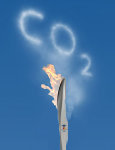Offsetting an Olympic Size Carbon Footprint
 GLOBE Net - To help deliver a carbon neutral 2010 Winter Games, Vancouver 2010 is partnering with Offsetters Green Technology Inc., a leading BC-based carbon asset management company and supplier of high-quality carbon offsets.
GLOBE Net - To help deliver a carbon neutral 2010 Winter Games, Vancouver 2010 is partnering with Offsetters Green Technology Inc., a leading BC-based carbon asset management company and supplier of high-quality carbon offsets.Under the terms of the $5 million agreement, Offsetters will provide the Vancouver Organizing Committee for the 2010 Olympic and Paralympic Winter Games (VANOC) with a portfolio of carbon offset projects created by partnering with local clean energy technology providers.
The carbon offset portfolio will invest in technological projects that serve to improve energy efficiency or utilize energy produced from renewable resources such as wind, solar, or geothermal. The proposed direct offsets are estimated to reduce GHG emissions by 110,000 tons through the use of alternative fuels such as hydrogen in fuel cell buses. The partnership will also endeavour to eliminate 190,000 tons of indirect carbon emissions caused by activities such as air travel.
“Working with leading BC Clean Technology companies — including Nexterra, Sempa Power, Lignol Innovations, Ballard Power and Powertech — we will create and verify a portfolio of clean technology offset projects that will neutralize direct emissions from the Games and contribute toward offsetting indirect emissions from air travel,” said Dr. James Tansey, president of Offsetters.
The portfolio will include offsets that capture and store carbon from the atmosphere such as forestry and land use projects, but priority will be given to BC-based products that enable and enhance local community sustainability plans.
In turn, Offsetters will receive sponsorship rights as the carbon offsets Official Supplier for the 2010 Winter Games and for the Canadian Olympic Team competing at the Vancouver 2010 Olympic Winter Games and the London 2012 Olympic Games.
According VANOC Chief Executive Officer, John Furlong, all offset projects in the 2010 portfolio will be of high-quality and consistent with standards applied by the new BC-based Pacific Carbon Trust.
The 2010 Winter Games are the first in Olympic history to have an Official Supplier of Carbon Offsets, said Furlong. ” [Offsets are] a crucial step forward toward meeting our goal to make the 2010 Olympic Games as environmentally responsible as possible,” he said.
In setting its 300,000-tonne carbon offset target, VANOC relied on a 2007 preliminary carbon emissions forecast prepared for it by the David Suzuki Foundation and subsequently reviewed by PricewaterhouseCoopers.
The independent assessment predicted that, based on planning at that stage, the Games would produce an estimated 110,000 tonnes of direct carbon emissions and another 220,000 tonnes from indirect sources such as the emissions from air travel.
Despite these extensive efforts, another 190,000 tons of emissions have yet to be accounted for. Climate change specialist, Deborah Carlson from the David Suzuki Foundation, told the CBC that in order to be considered “carbon neutral” VANOC must ensure that “all” of the games emissions are offset, adding that the organizing committee deserves credit for stressing the value of carbon offsets and sustainability.
“We’ve made good progress, and have been particularly sensitive to environmental sustainability in the construction of our venues, however its simply not possible to totally eliminate carbon emissions from the 2010 Winter Games,” Furlong said.
Linda Coady, the VANOC’s vice-president of sustainability, said that it will be up to competing countries, sponsors and spectators to buy their own offsets from Offsetters in order to account for the remaining carbon emissions. Sponsors such as Coca-Cola have announced that they will attempt carbon neutrality by using hybrid vehicles and energy efficient equipment.
In October 2009, VANOC will release an updated forecast of its carbon emissions with the help of the University of British Columbia’s Sauder School of Business. “For the past year the centre has been helping VANOC develop a credible methodology for measuring the carbon footprint of the Games,” said Dr. James Tansey, associate professor and director of Sauder’s Centre for Sustainability and Social Innovation. “Their comprehensive approach demonstrates they are taking their carbon responsibility seriously.”
After the Games, a third-party verified report on the actual emissions arising from the 2010 Winter Games will be released.
You can return to the main Market News page, or press the Back button on your browser.

